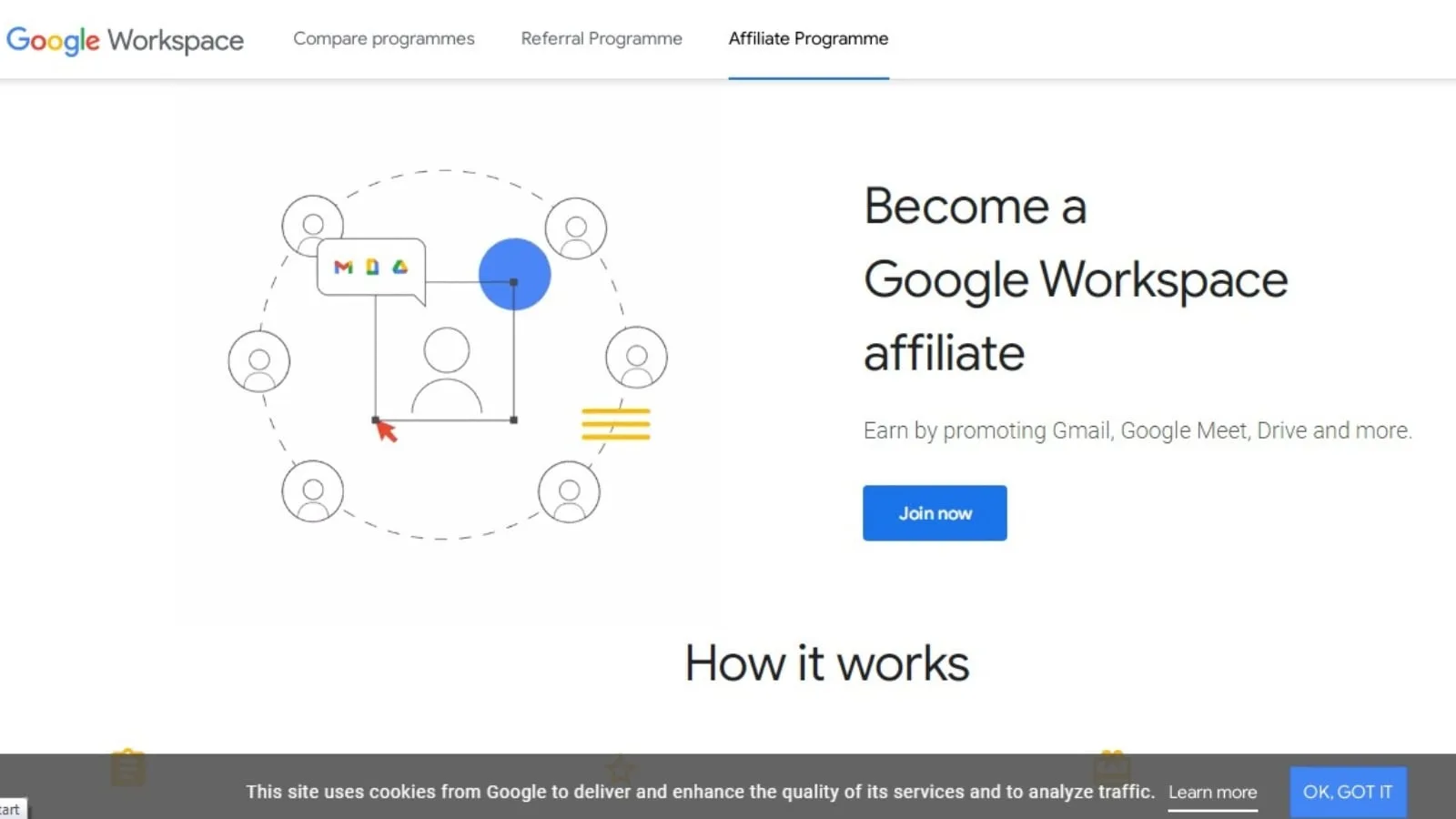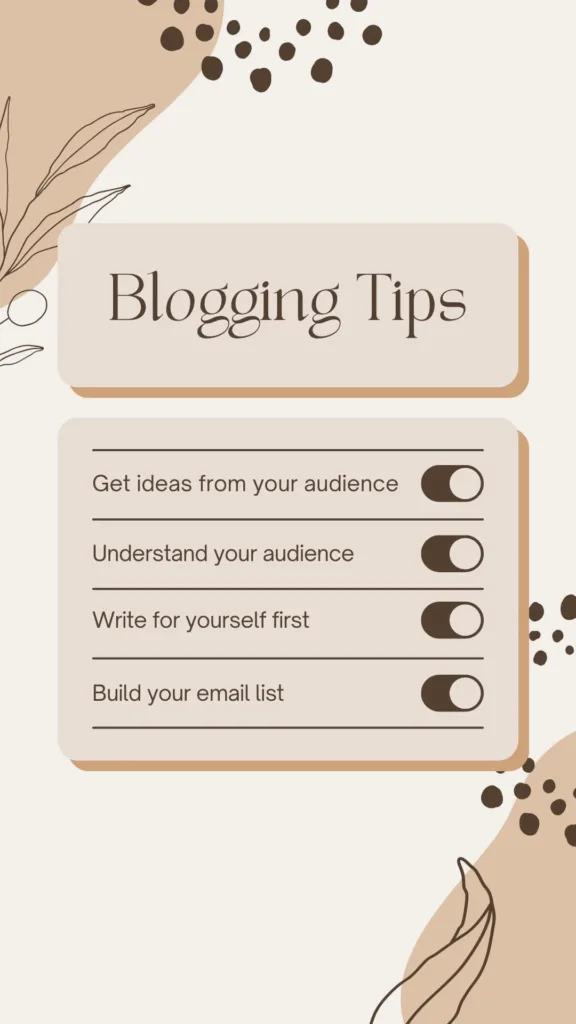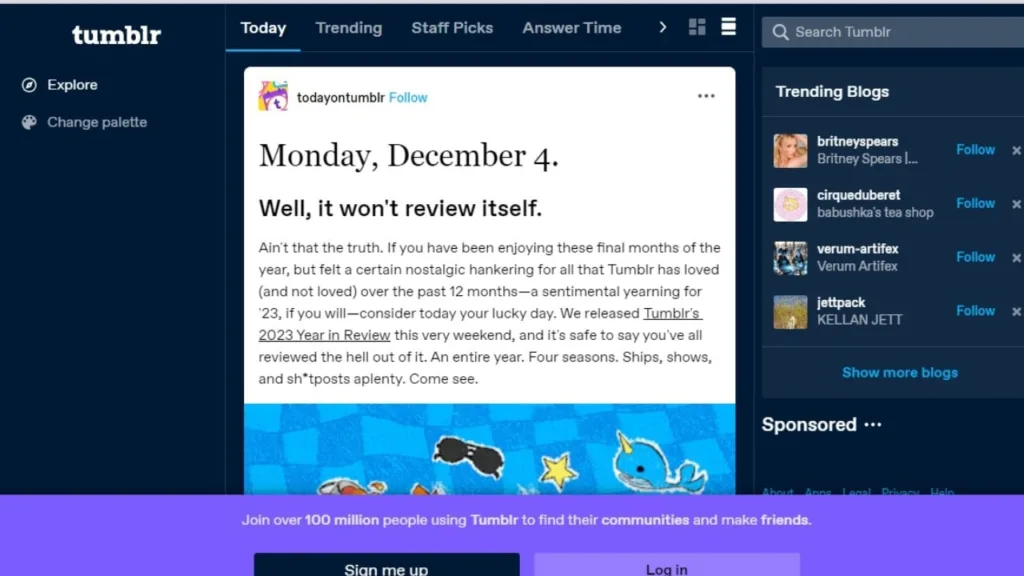Best Blogging Platforms For Affiliate Marketing

Affiliates promote products or services for a commission or reward generated from customer actions. Affiliates support a variety of online platforms, including websites, blogs, social media, email, and even paid advertising, to reach potential customers.
Imagine you’re telling your friend about an awesome new app you found. You love it so much, you can’t stop talking about it! You tell them all about its cool features and how it makes your life easier.
This is a bit like affiliate marketing. People called “affiliates” recommend products or things they like to their friends, family, or followers online. They write blog posts, make videos, or share on social media.
When someone clicks a special link in their post and buys something, the affiliate gets a little reward. It’s like a thank you for helping the business sell something!
Unique referral links and codes enable clear tracking of the affiliate’s contribution to sales or conversions, ensuring fair and accurate reward attribution.
So, the next time you see someone recommending something online, remember the affiliate behind it.
Table of Contents
1. What is Affiliate Marketing?

Affiliate marketing allows you to earn commissions by promoting other people’s or companies’ products. You don’t need to worry about creating or buying your own products, but you’ll focus on finding valuable products you believe in and promoting them to your audience.
This can be a great way to start a business online without a large upfront investment. However, it’s important to remember that success requires effort and some online skills such as content creation and audience building.
By providing valuable information and recommendations, you can help customers discover products they might not have found otherwise. Affiliates who excel at building trust and engaging with their audience can build a successful income stream while also offering value to their followers.
If you’re interested in learning more about affiliate marketing, there are many resources available online, including guides, tutorials, and communities of other affiliates.
There are many benefits of Affiliate Marketing:
- Passive Income Potential: Imagine earning commissions while you sleep! Affiliate marketing offers the chance to build a consistent income stream through commissions on sales or leads generated, even when you’re not actively promoting.
- Minimal Investment, Maximum Potential: With affiliate marketing, you focus on promoting existing products, and letting the business handle production, storage, and shipping. This translates to low startup costs and minimal risk, especially compared to traditional business ventures.
- Location Freedom: Affiliate marketing thrives on flexibility. Work from anywhere, anytime, as long as you have an internet connection. Instead of the other way around, design your timetable around your life.
- Customer Service Perks: As an affiliate, you focus on recommending great products, while the business handles any returns, complaints, or support issues.
- Diverse Channel Choice: Whether it’s through captivating blog posts, engaging social media content, or targeted email campaigns, you choose the channels that best suit your voice and audience.
- Scalability and Growth: Start small and steadily build your audience, seeing your income grow alongside your reach. In the realm of affiliate marketing, the possibilities are endless!
Remember, while these benefits are enticing, successful affiliate marketing requires effort, skill development, and strategic content creation. However, the potential rewards can be significant, making it a valuable income opportunity for many.
Turn your ideas into a polished e-book in just weeks with our online course.
You’ll learn:
- Crafting a captivating hook and outline
- Structuring your content for maximum impact
- Writing clear and engaging prose
- Designing a beautiful and professional layout
- Marketing your e-book to the world
No experience is needed! Just passion and a willingness to learn.
Enroll now and get:
- Lifetime access to the course materials
- Expert instructor support
- A supportive community of fellow writers
Don’t let your e-book dream gather dust. Take action today!
P.S. The first 10 students get a free bonus e-book template!
Let’s make your e-book a reality!
Fill The Form
2. How Affiliate Marketing Works In 2024:

If you’re scrolling through your favourite social media feed when you see a captivating post from someone you trust. They’re raving about a new product that’s changed their life, and guess what? They have a special link for you to try it out.
That’s the magic of affiliate marketing, a collaborative effort where businesses partner with individuals (affiliates) to promote their products or services. It’s a win-win for both sides:
Businesses:
- Reach new audiences: Affiliates have established followings and credibility, allowing businesses to tap into new customer segments they might not have reached otherwise.
- Boost sales: Every click on an affiliate link and subsequent purchase translates to increased revenue for the business.
- Cost-effective marketing: Unlike traditional advertising, businesses only pay for results (sales or leads) generated through affiliate efforts, making it a cost-effective marketing strategy.
Individuals (Affiliates):
- Earn passive income: By promoting products they genuinely believe in, affiliates can earn commissions on sales generated through their unique affiliate link, even while they sleep.
- Be their own boss: Affiliates enjoy the freedom and flexibility of working on their own terms and schedules.
- No upfront investment: Unlike starting a traditional business, affiliate marketing requires minimal investment, making it accessible to anyone with an internet connection and a passion for sharing.
Here’s How Affiliate Marketing Works:
An affiliate programme is established by a company, and each affiliate is given a special affiliate link. Think of this link as a special code that tracks the affiliate’s contribution to sales.
Using their affiliate link, the affiliate markets the company’s goods and services to their audience. This could be through blog posts, social media content, email campaigns, or even video reviews.
The affiliate receives a commission when a customer clicks on the link and purchases something. The commission rate varies based on the type of business and the advertised good or service. Some businesses offer a percentage of the sale price, while others offer a fixed fee per lead generated.
Affiliate marketing is a powerful tool for both businesses and individuals. It allows businesses to expand their reach and boost sales while providing individuals with a flexible and potentially lucrative way to make money online. So, whether you’re a business owner looking for new marketing strategies or an individual seeking income opportunities, affiliate marketing might just be the key you’ve been looking for.
Remember, successful affiliate marketing requires trust, transparency, and valuable content. By building genuine relationships with your audience and offering helpful recommendations, you can unlock the full potential of this rewarding collaboration.
Turn your passion into income? Affiliate marketing might just be the key! But before you jump in, let’s know the roadmap to building a rewarding income stream by simply connecting people with awesome products you already love:
1. Find your niche:
Don’t be a jack-of-all-trades, master of none. Instead, choose a niche that sparks your passion or expertise. Whether it’s fitness, travel photography, or sustainable living, find your corner of the internet and become the go-to guide.
2. Search right partners:
Once you’ve held up your claim, research affiliate programs that align with your niche and values. Platforms like Amazon Associates, ShareASale, and ClickBank offer a vast array of options. Remember, choose reputable programs with clear terms and conditions.
3. Build your audience:
Your platform is your launchpad. Whether it’s a blog, a captivating YouTube channel, or a vibrant social media hub, create a space where your audience feels welcome and engaged. Quality content is key – offer valuable information, solve problems, and sprinkle in your affiliate links like delicious spices.
4. Content is king (and queen):
Remember, your audience isn’t just a click away from a purchase; they’re real people seeking solutions and inspiration. Craft engaging content that educates, entertains, and adds value to their lives. Integrate your affiliate links seamlessly, but prioritize genuine recommendations over sales pitches.
5. Transparency is your superpower:
Trust is the currency of affiliate marketing. Be upfront about your partnerships, disclose your affiliate relationships clearly, and always prioritize authenticity. Your audience will appreciate your honesty and reward you with loyalty.
6. Track your progress:
Numbers don’t lie. Use analytics to see which links perform best, understand your audience’s preferences, and constantly refine your strategies. Adapt, experiment, and watch your affiliate journey flourish.
7. Stay legal, stay ethical:
The internet is a vast landscape, but remember, there are rules. Adhere to the guidelines set by affiliate programs and ensure your practices comply with legal regulations. Ethical marketing is not just the right thing to do, it’s the foundation for long-term success.
Keep in mind that affiliate marketing is a journey rather than a sprint. Consistency, patience, and a genuine focus on providing value to your audience are the keys to unlocking your full potential. So, grab your passion, choose your niche, and embark on your affiliate adventure! The world of online opportunities awaits!
3. Can I Use Blogger For Affiliate Marketing?

Absolutely! But like any journey, the first step is choosing the right direction. And that direction comes in the form of your niche.
Finding your profitable niche is the golden question for new bloggers. It’s the foundation upon which your success, and ultimately your income, will be built. It’s not about chasing the hottest trends or the most money; it’s about finding a space that aligns with your passion, expertise, and target audience.
Think of it like planting a seed. You wouldn’t just fling random seeds across the garden and hope for the best, would you? You’d carefully choose the right soil, sunlight, and nutrients for each plant to flourish. Your niche is that fertile ground where your content and affiliate partnerships can truly blossom.
Here’s why choosing the right niche matters:
- Focus: A clear niche allows you to create targeted content that resonates deeply with your audience. You become the go-to expert in your corner of the internet, building trust and loyalty.
- SEO Power: When you focus on a specific niche, you’re targeting relevant keywords and building authority within that space. This translates to better search engine rankings, attracting more organic traffic to your blog.
- Affiliate Synergy: Partnering with brands in your niche becomes easier and more fruitful. You’ll attract relevant affiliate programs, offering products and services your audience genuinely needs and wants.
Now, let me tell you a little bit about my success stories. I’ve been in the affiliate marketing and blogging world for over a decade, and my blog consistently brings in over $16,000 per month. Why? Because I found the right niche, one that I’m passionate about and that offers valuable affiliate opportunities.
Choosing the right niche isn’t a one-size-fits-all formula, but here are some tips to get you started:
- Explore your interests: What are you passionate about? What do you love learning and talking about? Your enthusiasm will shine through and attract the right audience.
- Identify problems you can solve: Think about the challenges your target audience faces. Can your knowledge or experience help them overcome those challenges?
- Research profitable niches: While passion is key, don’t ignore the potential for monetization. Look for niches with a healthy volume of searches and established affiliate programs.
- Don’t be afraid to niche down further: The more specific your niche, the more targeted your content and the stronger your connection with your audience.
Remember, your niche is the bedrock of your affiliate marketing journey. Choose wisely, cultivate it with passion, and watch your blog blossom into a thriving online empire.
So, are you ready to find your profitable niche and start building your Blogger dream? Let the adventure begin!
4. Best Blogging Platforms For Affiliate Marketing In 2024:

Free blogging platforms for affiliate marketing can be a great way to dip your toes into the world of affiliate marketing without a significant initial investment. While they come with limitations and risks compared to self-hosted sites, they offer several advantages for beginners:
- Cost-effective: No upfront hosting or domain costs, allowing you to focus on content creation and learning.
- Easy setup: Quick and user-friendly interface for creating and publishing your blog.
- Built-in audience: Some platforms have large user bases, potentially attracting traffic to your content.
- Low-risk experimentation: Test your ideas and affiliate partnerships before committing to a self-hosted site.
However, it’s important to be aware of the limitations of free platforms for affiliate marketing:
- Monetization restrictions: Some platforms may limit or prohibit affiliate links or ads.
- Branding limitations: You may have less control over your domain name and website design.
- Lower search engine authority: Free platforms generally rank lower in search results compared to self-hosted sites.
- Stability concerns: Your blog could be subject to sudden closures or content removals by the platform.
Therefore, while free platforms can be a good starting point, they’re not ideal for long-term affiliate marketing strategies. As your blog and income grow, consider migrating to a self-hosted platform for greater control, flexibility, and long-term stability.
Remember, the platform you choose should align with your goals, budget, and technical skills. As you progress in your affiliate marketing journey, be prepared to eventually transition to a self-hosted platform for sustainable success.
Let’s explore some best blogging platforms for affiliate marketing:
1. Medium For Affiliate Marketing:
- Medium can be a good option for starting out with affiliate marketing, especially if you prioritize clean design, simplicity, and access to a large audience. It boasts several advantages:
- High domain authority: Google loves Medium, meaning your content has a higher chance of ranking well in search results, potentially driving organic traffic to your affiliate links.
- Built-in audience: Medium’s 200 million monthly visitors offer a ready pool of potential customers, increasing your chances of reaching the right people.
- Easy-to-use interface: Creating and publishing content on Medium is straightforward, making it accessible for beginners.
However, remember that while Medium allows affiliate links, it has limitations:
- Limited monetization options: You won’t have full control over advertising or other monetization strategies beyond Medium’s Partner Program.
- Branding constraints: You can’t customize your blog’s domain name or design as much as with a self-hosted platform.
- Platform dependence: Your blog ultimately resides on Medium’s platform, making it subject to its policies and potential changes.
Therefore, Medium is a good starting point for affiliate marketing, but it’s essential to consider its limitations. And one of the best blogging platforms for affiliate marketing. As your audience and income grow, you might eventually need to transition to a self-hosted platform for greater control and flexibility.
Here are some additional points to consider:
- Always disclose your affiliate relationships: Regardless of the platform, be transparent with your readers about any affiliate links you use.
- Focus on high-quality content: Building trust with your audience through valuable content is key to successful affiliate marketing, no matter the platform.
- Experiment and track your results: See what content resonates with your audience and drives the most affiliate sales.
Overall, Medium can be a valuable tool for launching your affiliate marketing journey, but remember it’s not a long-term solution for everyone. Be mindful of its limitations and keep your options open for future growth.
2. Google Sites For Affiliate Marketing:
Google Sites can be a decent starting point for affiliate marketing, especially for those seeking a simple, free platform with Google’s inherent domain authority. However, it’s crucial to understand both its advantages and limitations:
Advantages:
- Free to use: No hosting or domain costs, making it a budget-friendly option for beginners.
- Easy to use: Google Sites offers a drag-and-drop interface, making it easy for anyone to create and publish content.
- High domain authority: Content on Google Sites benefits from Google’s domain authority, potentially improving your search engine rankings and attracting organic traffic.
- Integration with Google services: Easy integration with other Google services like Google Docs and Google Analytics can streamline your workflow.
Limitations:
- Limited functionality: Google Sites offers basic features and limited customization options compared to other platforms.
- Monetization restrictions: While affiliate links are allowed, you may have limited control over ad placement and other monetization methods.
- Branding limitations: You can’t use a custom domain name or fully personalize your website’s design.
- Platform dependence: Your blog is entirely dependent on Google Sites, making it subject to their policies and potential changes.
Therefore, while Google Sites can be a stepping stone for affiliate marketing, it’s not ideal for long-term success. As your audience and income grow, you’ll likely need to migrate to a self-hosted platform for greater control, flexibility, and monetization options.
Remember, transparency is key: Always disclose your affiliate relationships clearly and prominently, regardless of the platform you use. Therefore, google site could be one of the best blogging platforms for affiliate marketing.
Overall, Google Sites can be a viable option for those starting with affiliate marketing on a tight budget. However, be aware of its limitations and consider transitioning to a self-hosted platform as your business evolves.
3. Blogger For Affiliate Marketing:
Blogger.com can be a nostalgic choice for those familiar with its long history as a free blogging platform. While it offers some benefits for beginners, it’s important to consider its limitations before starting your affiliate marketing journey:
Advantages:
- Free to use: No upfront hosting or domain costs, making it a budget-friendly option for beginners.
- Easy to use: The interface is familiar and straightforward, making it easy to create and publish content.
- Built-in audience: Blogger still attracts 57 million monthly visitors, offering potential reach for your affiliate links.
- Large community: A supportive community of Blogger users can offer guidance and resources.
Limitations:
- Limited functionality: Blogger offers basic features and limited customization options compared to other platforms.
- Branding restrictions: Your domain name will contain “blogspot.com,” which may appear less professional than a custom domain.
- Monetization restrictions: Blogger has stricter guidelines for affiliate marketing and ad placements compared to some self-hosted platforms.
- Platform dependence: Your blog is entirely dependent on Blogger, making it subject to their policies and potential changes, including sudden closures or content removals.
While Blogger can be a starting point, it’s not ideal for long-term affiliate marketing success. As your audience and income grow, you’ll likely need to migrate to a self-hosted platform for greater control, flexibility, and monetization options.
Remember: Focus on high-quality content: Building trust with your audience through valuable content is key to successful affiliate marketing, no matter the platform.
Overall, Blogger can be a stepping stone for those starting with affiliate marketing on a tight budget. However, be aware of its limitations and consider transitioning to a self-hosted platform as your business evolves.
4. WordPress.com For Affiliate Marketing:
WordPress.com can be a tempting option for beginners due to its familiar interface and ease of use. However, it’s important to understand its limitations before using it for affiliate marketing:
Advantages:
- Easy to use: The interface is similar to the popular WordPress.org platform, making it familiar to many users.
- No technical setup: You don’t need to worry about hosting or domain registration, making it a quick and easy option.
- Access to plugins and themes: You can access a limited selection of plugins and themes for customizing your blog.
Limitations:
- Branding restrictions: Your domain name will contain “wordpress.com,” which may appear less professional than a custom domain.
- Monetization limitations: WordPress.com has stricter guidelines for affiliate marketing and ad placements, potentially limiting your income potential.
- Limited control: You have limited control over design, functionality, and plugin options compared to self-hosted WordPress.
- Platform dependence: Your blog is entirely dependent on WordPress.com, making it subject to their policies and potential changes, including ad restrictions or even blog removals.
Therefore, while WordPress.com can be a convenient starting point, it’s not ideal for long-term affiliate marketing success. As your audience and income grow, you’ll likely need to migrate to a self-hosted WordPress.org site for greater control, flexibility, and monetization options.
Remember: Always disclose your affiliate relationships: Be transparent with your readers about any affiliate links you use, regardless of the platform.
Focus on high-quality content: Building trust with your audience through valuable content is key to successful affiliate marketing, no matter the platform.
Overall, WordPress.com can be a helpful tool for experimenting with affiliate marketing, but be prepared to eventually transition to self-hosted WordPress for sustainable growth
Conclusion
Choosing the best blogging platform for affiliate marketing is like picking the right tool for the job. While free platforms like Medium, Google Sites, and Blogger can get you started, they have limitations like branding restrictions, limited control, and potential closures. For long-term success, consider self-hosted platforms like WordPress.org. They offer more control, customization, and monetization options, allowing you to build a professional and sustainable affiliate business. Remember, the perfect platform depends on your needs and goals. Start small, experiment, and choose the one that gives you the flexibility and power to grow your affiliate marketing empire!
FAQs
1. Can I use free platforms like Blogger or WordPress.com for affiliate marketing?
Yes, you can! These platforms are a great way to start and get your feet wet. They’re free, easy to use, and have built-in audiences. However, keep in mind that they have limitations:
- Branding restrictions: You won’t have a custom domain name, which can look less professional.
- Monetization limitations: Some platforms have restrictions on affiliate marketing or ads, hindering your income potential.
- Platform dependence: Your blog is entirely dependent on the platform, making it subject to their policies and potential changes.
While free platforms offer a good starting point, consider migrating to a self-hosted platform like WordPress.org for long-term success and greater control.
2. What are the benefits of using a self-hosted platform like WordPress.org for affiliate marketing?
Self-hosted platforms offer several advantages over free platforms:
- Complete control: You own your website and have complete control over its design, content, and monetization.
- Professional branding: Choose your own domain name and customize your website to create a strong and professional brand identity.
- Flexibility and scalability: Add features, plugins, and functionality as your audience and business grow.
- Higher search engine authority: Self-hosted sites generally rank higher in search results, leading to better organic traffic.
Investing in a self-hosted platform may require an initial setup cost, but it’s a worthwhile investment for serious affiliate marketers who want to build a sustainable business.
3. What are some popular self-hosted platforms besides WordPress.org?
WordPress.org is the most popular self-hosted platform, but there are other great options to consider, such as:
- Wix: Easy-to-use drag-and-drop interface with beautiful templates.
- Squarespace: All-in-one platform with built-in marketing tools.
- Ghost: Simple and focused platform for writers and bloggers.
Choosing the right platform depends on your technical skills, budget, and desired features. Before choosing, do some research and compare several possibilities.
4. How do I ensure my affiliate links are compliant with platform policies and FTC regulations?
- Always disclose your affiliate relationships clearly and prominently on your blog, regardless of the platform you use. Here are some tips:
- Use clear and concise language like “This post contains affiliate links” or “I may earn a commission if you purchase through my links.”
- Link to your affiliate disclosure page, which should explain your affiliate relationships in detail.
- Don’t make misleading claims or over-hype the products you’re promoting.
- Developing a strong connection with your audience is essential for effective affiliate marketing. Be transparent and honest about your affiliate relationships to avoid any legal or ethical issues.
5. Where can I find more resources and tutorials on affiliate marketing and blogging?
The internet is a treasure trove of resources for aspiring affiliate marketers! Here are a few useful starting points:
- Blogs and websites: Many blogs and websites offer valuable tips and strategies for affiliate marketing and blogging.
- YouTube channels: Watch video tutorials and learn from experienced affiliate marketers.
- Online courses: Invest in a comprehensive online course to learn the ins and outs of affiliate marketing.
- Affiliate marketing communities: Join online communities and forums to connect with other affiliate marketers and learn from their experiences.
Understand that affiliate marketing is a process rather than a quick fix.Be patient, learn from your mistakes, and keep creating valuable content for your audience. With the right platform, strategies, and dedication, you can build a successful affiliate marketing business and achieve your financial goals.












